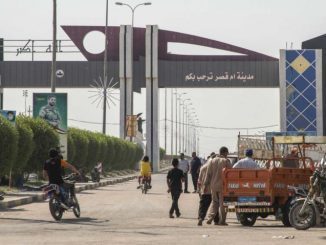
Egypt’s Administrative Court has returned Tiran and Sanafir islands case back to the scene. The court has nullified the controversial demarcation border agreement that stipulates the transfer of Tiran and Sanafir islands to Saudi Arabia.
In April, Abdel Fattah al-Sisi signed the agreement with Saudi Arabia to win economic concessions, finance and investment from Riyadh, but it has agitated the public opinion’s anger and led to unprecedented protests since the military coup in 2013. The protests were the first major opposition against al-Sisi since he reached power as the protesters chanted calling for his downfall. Despite the police forces repression of the peaceful protests, but it was considered one of the major blows to al-Sis’s popularity that appeared shaky and fragile. The Egyptian authorities carried mass arrests of activists and journalists and even stormed the Press Syndicate building for the first time in its history to arrest two journalists.
Last week, al-Sisi has received another blow from the judicial institution when Judge Yahya al-Dakroury nullified the agreement, stating that the islands near the mouth of the Gulf of Aqaba “should remain part of Egyptian territory.” Stratfor Global Intelligence firm wrote in in its report: “In Egypt, a Rare Problem for A World Leader” that “the Supreme Administrative Court, the highest administrative court in Egypt, is set to hear an appeal of the decision on June 26.
Even if al-Dakroury’s ruling was overturned, it still represents a political blow to al-Sisi.” It added that although the verdict won’t change Saudi Arabia to go back on its support for al-Sisi’s government, but “the case could further embolden Egyptian opposition groups and strain the president’s popular support. “
The Administrative Court’s verdict empowers the Egyptian public opinion’s stance. Moreover, the verdict reading was concise upholding the country’s control of the islands and affirming that “it is forbidden to change their status in any form or through any procedure for the benefit of any other state.” Article 152 of the 2014 Egyptian Constitution includes three salient points relevant to the case:
“The President of the Republic shall represent the State in its foreign relations and conclude treaties and ratify them after the approval of the House of Representatives. Voters must be called for a referendum on the treaties related to making peace and alliance, and those related to the rights of sovereignty. Such treaties shall only be ratified after the announcement of their approval in the referendum.
In all cases, no treaty may be concluded which is contrary to the provisions of the Constitution or which results in ceding any part of state territories.”
The appeal will be presented to the Administrative Court. If the court confirms its previous decision that the islands are part of the Egyptian territory, therefore the agreement with Saudi Arabia will be unconstitutional. In this case, al-Sisi — should respect the final verdict or challenge it; but this will need to seek a constitutional amendment to push the deal, according to Stratfor.
On the other hand, Stratfor stated that If the court decides that the islands are not Egyptian territory but that Egypt has been exercising sovereign power over them, then the deal could require parliamentary approval and a public referendum.
Another alternative was stated by Stratfor that,” The court could determine that Egypt is only administering the islands without acting in a sovereign manner. In that case, the deal, like any other treaty, would only need the parliament ratification to be valid. Otherwise, the court could rule that the deal was a sovereign decision over which it has no jurisdiction.”
Stratfor has also pointed out that the judicial system has always played a fundamental role in post-Mubarak Egypt in cracking political opposition. “In 2012, the Supreme Constitutional Court dissolved the Islamist-dominated parliament under former President Mohammed Morsi, contributing to the rise of the Tamarod Movement, “said Stratfor.
In fact, the judicial system has always been one of the main arms of the military rule under the al-Sisi power. It has worked to maintain al-Sisi’s rule and suppress his political opponents.
Stratfor pointed, “Since Morsi’s removal, the Supreme Council of the Armed Forces (SCAF) and its head, al-Sisi, have been successful in cracking down on judges favorable to the Muslim Brotherhood by forcing their early retirement.”
For the State Council, it also worked in strengthening al-Sisi’s power. It backed al-Sisi government when the Administrative Court declined to review a 2013 law that severely restricts legal protests, citing a lack of jurisdiction.
Furthermore, the trend in Egyptian judiciary rulings has broadly favored strengthening stability, a position that al-Sisi shares. Accordingly, it isn’t expected that the Administrative Court will challenge the al-Sisi regime as “most observers think the Supreme Administrative Court will uphold the island transfer,” as stated by Stratfor. But if it does not, al-Sisi and his Cabinet said that they will respect the court’s ruling. Moreover, if al-Sisi wins a favorable judgment, it will demonstrate that he can work through the legal system rather than defy it.
Although the judicial system’s main trend is supporting al-Sisi, but Stratfor believes that if the court’s verdict came against al-Sisi, this would be a real challenge to his power and it would encourage the rise of further opposition against him.
Regarding Saudi Arabia’s stance, Stratfor claims that “Saudi Arabia has been noticeably silent about the public backlash against the island deal and the court’s ruling.” It also claimed that Riyadh would like the islands to be returned to the Saudi control, but realistically, the islands are of little economic or military value to either country.” The strategic value of the territory has declined dramatically since the post-World War II era, when Israel was establishing itself, according to Stratfor. In addition, Riyadh’s need for al-Sisi is crucial to prevent a resurgence of the Muslim Brotherhood and wants Egypt’s support for larger security initiatives in places like Yemen. “For these reasons, Saudi Arabia will continue to back the al-Sisi government financially to limit the potential for Egypt’s financial crisis to cause his government to fail,” as reported by Stratfor.



